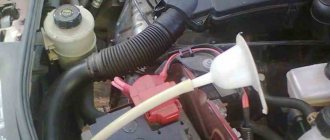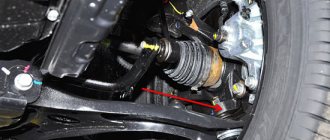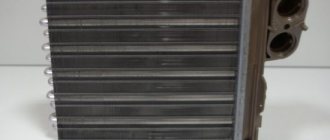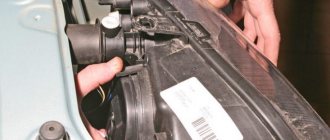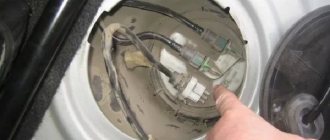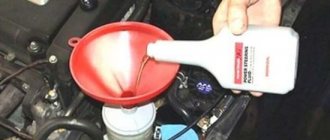Each engine part has its own service life and replacement schedule. The article will tell you when to change spark plugs on a Renault Logan, what spare parts are suitable and how to do it yourself.
Replacing spark plugs on a Renault Logan is a simple task that does not require special tools. Even a novice driver can handle it.
When to change spark plugs: signs, regulations
According to the repair and operating instructions, it is recommended to replace spark plugs in Renault Logan upon reaching the following mileage:
- for engines K7J (1.4 l, 8 cells) and K7M (1.6 l, 8 cells) - 15,000 kilometers;
- for the K4M engine (1.6 l, 16 cells) - 30,000 kilometers.
Symptoms of a problem
- the engine is shaking - the unit jerks during operation, and the sound of operation is uneven, with interruptions;
- the engine stalls at idle;
- The speed “floats” - it spontaneously increases or decreases, regardless of pressing the gas pedal.
These problems may occur due to problems with other components of the ignition or power system. But you should start checking with the spark plugs, since deposits on their surfaces may indicate the reason for the uneven operation of the engine:
- Red or tan - there are many additives in gasoline. It is recommended to change the refueling location.
- Black oily - oil enters the combustion chamber or the heat rating is less than required.
- Soot is a fuel-air mixture that is over-enriched or does not burn completely.
Useful tips when doing work
It is noted that when replacing spark plugs, they must first be tightened by hand, and then use special tools. It is also recommended to carry out rotational movements with a spark plug wrench or an extension cord, manipulating exclusively with your hands.
But the ratchet should not be used in such a situation. The same applies to the collar. The essence of such actions is that there is a danger of damaging the threads on the spark plug shaft, which is very difficult to restore with ordinary repair work.
Optimally, turn the spark plugs a quarter turn. If you feel a problem with the spark plug, you need to unscrew it and try to screw it in again. After replacing the spark plugs, high-voltage terminals are put on them. It is recommended to pre-lubricate them with grease. It is recommended to use FLUORINE GREASE, but you can also use simple technical Vaseline.
Don’t forget that Logan’s engine cylinders are numbered on the flywheel side.
Brief characteristics of engines
| Characteristics | K7J (1.4 l) | K7M (1.6 l) | K4M (1.6 l) |
| Engine capacity, cc | 1390 | 1598 | 1598 |
| Power, hp | 75 | 80 — 90 | 100 — 115 |
| Number of cylinders | 4 | 4 | 4 |
| Number of valves | 8 | 8 | 16 |
| Torque, Nm | 112 | 124 — 137 | 145-156 |
Analogs
As analogues of the original spark plug for Logan 1.6 marked 7700500168, you can use:
- Bosch products with index 0241235751;
- Denso spark plugs and marked K20TXR.
For those drivers who drive cars with a sixteen-valve engine, if there is no opportunity or desire to find original spark plugs for Logan 1.6, you can consider the following analogues:
- Bosch spark plugs with index 0242235666;
- BERU Z 193 spark plugs. An excellent option for those Renault Logan owners who are not used to frequently taking their car for service or looking under the hood on their own to replace spark plugs would be to use iridium spare parts instead of standard nickel ones. The main difference is the service life, which increases four times. Many motorists note an increase in the dynamic characteristics of the car after replacing nickel spark plugs with iridium spark plugs.
The most popular among Logan owners equipped with a 1.6 and 1.4 liter engine are spark plugs from the Japanese manufacturer Denso IK20TT. Owners of cars with a 1.2-liter D4F installed under the hood of the second generation model use parts of the same brand, but with the index IXEH20TT. There is another option when Renault Logan owners use NGK P spark plugs marked 6418.
Characteristics of original candles
| Engine | Thread | Thread pitch, mm | Thread length, mm | Number of electrodes | Heat number | Gap between side and center. electrodes, mm |
| D4F | M12 | 1.25 | 26.5 | Only 1 | 17 | 0,95±0,05 |
| K7J (1.4l, 8 cells) | M14 | 1.25 | 19 | Only 2 | 17 | 0,95±0,05 |
| K7M (1.6l, 8 cells) | M14 | 1.25 | 19 | Only 2 | 17 | 0,95±0,05 |
| K4M (1.6l, 16cl.) | M14 | 1.25 | 19 | 1-2 | 17 | 0,95±0,05 |
As a summary
Important! All of the above, both original and analogue spark plug products for replacement in Logan 2 petrol engines, are the most optimal at the time of writing this article, which cannot at all mean marking time in technologies for improving ignition elements.
And over time, and perhaps even now, new spark plugs from other manufacturers with other indices have appeared, which are better and more efficient than the above, both original and analog products for the Renault Logan 2 ignition system.
And don’t forget to subscribe to our Telegram channel to receive news
Article numbers of original parts
Original spare parts are indicated in the catalog with the following numbers:
- for D4F - 224018760R;
- for K7J and K7M - 7700 500168;
- for K4M - 7700 500 155.
Parts from the following manufacturers are installed from the factory:
- for motors K7J and K7M - Eyquem RFC 58 LZ 2E;
- for the K4M motor - Champion RYCLC87, Sagem.
Analogs
For K7J and K7M
| Manufacturer | vendor code | average price |
| ACDELCO | 19375663 | 147 |
| ACDELCO | R5602 | 240 |
| ASAM SA | 30530 | 349 |
| ASAM SA | 30529 | 499 |
| AUTOMOTOR FRANCE | ASP0306 | 244 |
| BOSCH | 242235668 | 187 |
| BRISK | DR15LDC | 163 |
| BRISK | ALINE20 | 226 |
| BRISK | 1372 | 283 |
| CHAMPION | E026T10 | 333 |
| CHAMPION | RC8DMC | 382 |
| DENSO | K20TXR | 371 |
| EURO REPAR | 1625936880 | 147 |
| FEBI | 13503 | 204 |
| FINWHALE | FS21 | 127 |
| FRANCECAR | FCR211057 | 184 |
| KLAXCAR FRANCE | 43018Z | 185 |
| MOTRIO | 8671004070 | 194 |
| MS MARSHAL | K7RTC | 127 |
| NGK | BKR6EK | 340 |
| PATRON | SPP3023 | 152 |
| TORCH | K6RIU | 284 |
| VALEO | 246851 | 280 |
| VEMO VAICO | V99750023 | 296 |
For K4M
| Manufacturer | vendor code | average price |
| ACDELCO | 19375663 | 147 |
| ASAM SA | 30530 | 349 |
| AUTOMOTOR FRANCE | ASP0007 | 130 |
| BERU | Z193 | 227 |
| BOSCH | 242235666 | 126 |
| BRISK | ALINE12 | 152 |
| CHAMPION | E005T10 | 133 |
| DENSO | K20PRU11 | 166 |
| EURO REPAR | 1625938880 | 143 |
| EYQUEM | RFN58LZ | 88 |
| FEBI | 13424 | 146 |
| FIAT ALFA LANCIA | 5894586 | 343 |
| FRANCECAR | FCR211044 | 135 |
| INTEGER | US1003M | 111 |
| KLAXCAR FRANCE | 43008Z | 148 |
| MANOVER | MR0765882 | 809 |
| MOTRIO | 8671004086 | 240 |
| NGK | 2288 | 294 |
| NGK | 4619 | 258 |
| NGK | 4388 | 317 |
| VALEO | 246851 | 280 |
For D4F
| Manufacturer | vendor code | average price |
| BERU | Z243 | 368 |
| BOSCH | 242129510 | 291 |
| BOSCH | 242129508 | 440 |
| BRISK | MR14LC | 181 |
| BRISK | P81626 | 306 |
| CHAMPION | E130 | 256 |
| DENSO | XE20HRU9 | 427 |
| EURO REPAR | 1625935480 | 265 |
| FRANCECAR | FCR30S063 | 216 |
| NGK | LZKAR7A | 413 |
Changing spark plugs on the K4M engine (16 valves)
To replace Renault Logan spark plugs with the K4M internal combustion engine, you will need to prepare the following tools and materials :
- a spark plug key identical to the previous point;
- ten socket socket with extension;
- probe for measuring the gap between the electrodes;
- new spark plugs - for the sixteen-valve Renault Logan engine, CHAMPION RYCLC87 or EYQUEM RFN58LZ are designed with a gap of 0.95 ± 0.5 mm;
- lubricant for ignition coil tips FLUOSTAR 2L and a two-millimeter roller for its application.
Replacing spark-forming elements on a Renault Logan with a sixteen-valve internal combustion engine:
- The supply block is disconnected from the coil (after having clamped the plastic clamp), which is mounted on each individual cylinder.
- The coil mounting bolt is unscrewed with a ten-point head.
- The coil is dismantled - to do this, pull it up.
- To prevent dirt particles from penetrating into the cylinder, the landing well should be blown out with compressed air.
- Using a specialized wrench, unscrew and pull out the spark plug.
- The condition of the spark-forming device is visually checked, and then the size of the gap between the electrodes is monitored. Adjustments are made if necessary.
- The prepared spare part is screwed in by hand and then tightened using a tool with a force of 25-30 N*m.
- The internal cavity of the coils is treated with lubricant.
- Reassemble in reverse order.
For all cylinders, the procedure for replacing spark plugs is identical.
We study the pros and cons of Renault Logan
Diagnostics
- If the fuel pressure regulator is not working well, it usually needs to be replaced. To verify that it is faulty, you need to unscrew the fuel return hose and then turn on the ignition. If gasoline comes out of this hose under high pressure, the regulator will not work. To eliminate a fault in the path, it is enough to plug one end of it, or press down the return pipe, thereby reducing its cross-section. Having carried out such work, you can easily get to the repair site.
- If the spark is not supplied to the cylinders properly, interruptions in engine operation occur. To verify that this unit is faulty, you must have a special wrench on hand for unscrewing the spark plugs. Having unscrewed the spark plugs, you need to connect them to the tips of the high-voltage wires and turn the starter several times. If the spark goes to the side or its strength is not enough, this unit needs to be replaced. As a rule, a car with such a breakdown can get to the repair site on its own
Attention! Follow safety regulations when carrying out such work. The high-voltage part of the car is very dangerous to life and health.
If the valve timing marks are set incorrectly, the engine runs with significant interruptions with characteristic popping noises.
This malfunction cannot be eliminated without the proper equipment and tools. If this malfunction occurs to you on the road, do not try to fix it yourself. Tow the car to the nearest car service center and only carry out repairs there.
If the damper that regulates the air flow is faulty, there are several ways to identify this breakdown and also fix it. Unscrew the air supply pipe and inspect the throttle valve for integrity.
When the engine is turned off, its position should be in the closed state. If this does not happen, this unit must be cleaned and then adapted using computer equipment. As practice shows, this malfunction appears gradually and cannot just happen on the road. Accordingly, such repairs must be done at a specialized service station.
If the engine of your Logan starts and immediately stalls after a while, pay attention to the dashboard, namely, whether the immobilizer indicator lamp is illuminated. If this indicator light flashes, the immobilizer unit has lost communication with the key chip. You can continue driving only by using another spare key to replace the old one.
With the help of special equipment, the key used can be registered in the program of the immobilizer unit, but this is done on special equipment.
Tip: Carry a spare key with you if you go on a long journey.
- The operation of fuel injectors can only be checked at an equipped stand; accordingly, such repairs are carried out by specialists.
- If the fuel filter in your car is clogged, of course, this element must be replaced. In case this situation befalls you on the road and the engine stalls, there are some recommendations for detecting and eliminating this malfunction.
- Open the hood, then remove the fuel supply hose and turn on the ignition. If gasoline is supplied under low pressure, the filter has poor throughput.
- To increase the throughput of the fuel filter, it must be removed and thoroughly blown in the opposite direction.
- Remove the fuel filter from its clips and perform some operations to clean the dirt from its housing. You can use a thin screwdriver and pierce the paper element right through.
- Install the filter in place, then start the engine; if the engine starts and runs smoothly, go to the nearest car service center, where it will be necessary to replace the filter element.
- If your car's engine suddenly stalls and won't start, you need to check the functionality of the fuel pump.
To identify a fuel pump malfunction, you need to open the hood and remove the gasoline supply hose. At this moment, you need to turn the key to position 2, thereby closing the fuel pump relay.
If gasoline does not flow, the fuel pump does not work well and has become unusable. We cannot give any recommendations for its emergency repair, since this unit is replaced complete with the housing. In such a situation, the car must be towed to the nearest service center where repairs will be carried out.
- If the problem is related to the operation of the crankshaft position sensor, it is impossible to diagnose and eliminate this malfunction without special equipment.
- Repairs should only be carried out by a specialized service center.
- Diagnosis and repair of problems associated with wear of the camshaft, as well as its sensor, is carried out only by an engine repair service.
No power at the fuel pump connector
If, as a result of checking the fuel pump, it was discovered that there is no power supplied to its connector, then first of all we check the fuse. The fusible element is located on the left side (along the direction of the car) of the engine compartment, in the safety block.
A blown fuse 99% indicates problems with the fuel pump, although the possibility of a short circuit of its positive wire to ground cannot be ruled out. It’s easy to check the latter - just insert a working fuse into the block when the connector is removed from the pump.
If, upon examination of the fuse, it was revealed that it remained intact, then you should check whether its contacts are receiving “plus” from the car’s on-board network. In addition, check the operation of the relay, which is responsible for switching the power supply to the fuel pump.
To do this, the device circled in the top photo is removed from the block, and a jumper is installed in its place. The latter closes the connectors corresponding to the power contacts of the switching element. The appearance of power at the pump terminals indicates that the circuit is working properly.
To find out whether the control voltage is supplied to the relay, check for the presence of a constant “plus” at the corresponding terminal in the fuse block block and diagnose whether the control “minus” is supplied to the block.
Keep in mind that “-12V” appears on the relay input contact only when the engine is running, so you should not only turn on the ignition, but also crank the engine with the starter. If the lamp connected to the control “minus” and positive terminals does not light up, then the cause may be either a broken wire to the control unit or problems with the ECU itself, the immobilizer, etc.
Something else useful for you:
Features and principle of operation
Spark plugs for gasoline and diesel engines are different in structure and slightly different in operating principle. In gasoline engines it is based on the transmission of a spark, and in diesel engines it operates on the principle of incandescence.
The main element of any candle is its body. It is made of hardened steel so that the device can withstand high loads of temperature and pressure. It has a thread for screwing into the cylinder block. A ceramic seal is installed inside the case. The main functional element for transmitting and receiving a spark is an electrode, of which there can often be two in a design, but there can be three or even four. The technical characteristics of candles, how they shine and their service life depend on the electrodes.
What signs indicate the need to replace spark plugs?
Recommendations for replacement are rather an indicator of the endurance of the part, which was determined in the laboratory. In real conditions, spark plugs on Renault Logan can become unusable much earlier, and they need to be urgently replaced. In order to identify the problem in time, it is recommended to inspect the spark plugs. The condition of the spark-producing element can be determined by its color. A properly functioning part should not be covered with a layer of black soot, and the ceramic body should be white. If there are yellow rings on it, it is better to change the spark plug.
To determine when to change spark plugs on a Renault Logan, you need to pay attention to the following symptoms:
- While driving, the driver feels obvious problems, which can be expressed in unstable engine operation, power is reduced, and it stalls at low speeds.
- Excessively high fuel consumption. This symptom may be caused by poor fuel combustion and, consequently, low power.
- Engine starting is unstable, operation at low speeds is difficult.
If the above symptoms are noticed, the first thing you need to do is check the spark plugs. Replacing them may resolve all problems.
About the types of spark plugs
The manufacturer has clearly adjusted Renault Logan when it is necessary to change the spark plugs, this is every 60 thousand km of the distance traveled.
Here the owner has the right to independently choose suitable candles. If the operation of the engine requires refueling with low-quality fuel, then the interval specified in the regulations, if it is necessary to replace spark plugs, should be reduced to 30 thousand km. This will avoid the unfortunate failure of these elements at the wrong time, as countless videos online have proven. Also in the video you can see the consequences of spark plug failure due to their premature replacement, which can negatively affect the condition of many parts of the power unit. From here it becomes obvious that owners wander through services when they neglect to observe the required frequency when changing spark plugs.
Since the Renault Logan engine line implies the presence of several options for power units with 8 valves and, accordingly, 16 valves with a volume of 1.4 and 1.6, an individual approach to the selection of the components considered here (for each engine) is required.
Today the market can offer a wide selection of consumables, such as candles. Many owners find it difficult to make the right choice of these accessories. Below is a list of the most popular and in-demand spark plugs from recognized industry leaders. Among the manufacturers whose products are fully compatible with the Renault Logan 1.4 and 1.6 variants are:
- NGK with BKRE series. This modification of the famous Japanese brand was not officially installed on Renault Logan engines, but in terms of its technical parameters it fully corresponds to all representatives of the French model’s engine line. The price of an original NGK spark plug averages 90 rubles, although this value may vary depending on the region. The product has an ideal gap between the electrodes, which fully meets the needs of Renault Logan engines, regardless of their modification and displacement. It is the size of the gap that plays a significant role in ensuring the optimal functioning of the power unit. When choosing candles, you should pay close attention to this aspect.
- The BKRE6IX series also belongs to the NGK company, which produces candles. These are varieties of iridium spark plugs, the price of which is already an order of magnitude higher (about 400 rubles per unit). These products have less electrode space, which some experts say helps improve motor efficiency. Test results for iridium ignition system elements indicate fuel savings of 5%. At the same time, however, there is an idea that this judgment does not fully correspond to reality, as well as the greater efficiency of iridium spark plugs. The resource for these consumer goods is regulated at the level of 50 thousand km, which is quite comparable with the service life of conventional candles, but only the price differs significantly. Here, some owners will think about the rationality of purchasing iridium products.
- Candles from the legendary German brand “Bosch” are very popular, having in their assortment original products with two contacts in the design. They are perfect for Renault Logan engines and have an affordable price.

